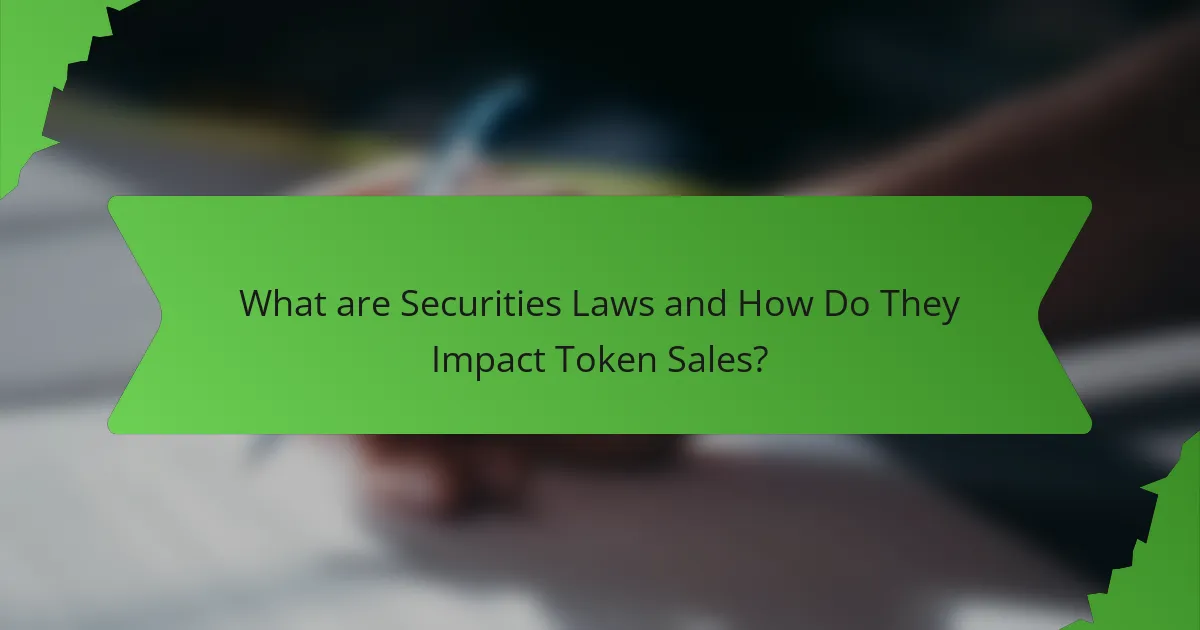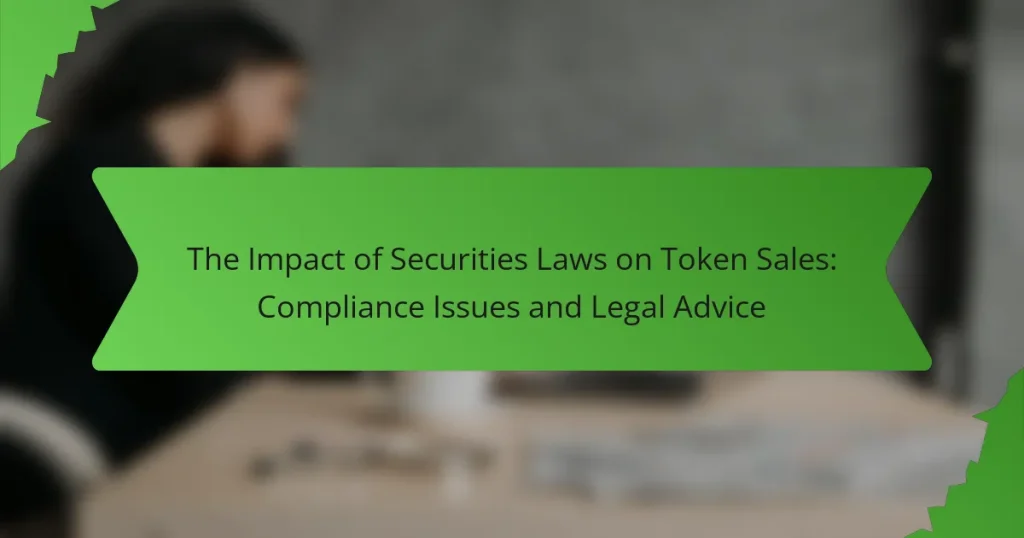Securities laws are regulations that oversee the issuance and trading of financial instruments, such as stocks and bonds, aimed at protecting investors and ensuring market transparency. Token sales, or Initial Coin Offerings (ICOs), may fall under these laws when tokens are classified as securities, requiring issuers to comply with registration and disclosure obligations. The article explores the complexities of global securities regulations, particularly in the United States, Europe, and Asia, highlighting how different jurisdictions classify tokens and the implications for compliance. It emphasizes the importance of legal assessments, transparent communication with investors, and adherence to anti-money laundering (AML) and know your customer (KYC) procedures to navigate the regulatory landscape effectively.

What are Securities Laws and How Do They Impact Token Sales?
Securities laws are regulations that govern the issuance and trading of financial instruments, including stocks and bonds. They aim to protect investors and ensure transparency in the financial markets. Token sales, often referred to as Initial Coin Offerings (ICOs), can fall under these laws if the tokens are classified as securities.
When tokens are deemed securities, issuers must comply with registration requirements and disclosure obligations. This includes providing detailed information about the project, its financial status, and the risks involved. Non-compliance can lead to legal repercussions, including fines or the cessation of operations.
In the United States, the Securities and Exchange Commission (SEC) evaluates whether a token qualifies as a security based on the Howey Test. This test assesses if there is an investment of money in a common enterprise with the expectation of profits derived from the efforts of others. If a token meets these criteria, it is subject to securities laws.
Compliance with securities laws is crucial for token sales to avoid legal challenges. Companies must seek legal advice to navigate these complex regulations. This ensures that they can successfully launch their token sales while adhering to legal standards.
Why are Securities Laws Important for Token Sales?
Securities laws are important for token sales because they regulate the offering and sale of tokens to protect investors. These laws ensure that token sales provide adequate disclosures about risks and financial information. Compliance with securities laws helps prevent fraud and promotes transparency in the market. In the United States, the Securities and Exchange Commission (SEC) oversees these regulations. Non-compliance can lead to legal repercussions, including fines and penalties. Historical cases, such as the SEC’s actions against unregistered token sales, highlight the necessity of adhering to these laws. Thus, securities laws play a crucial role in maintaining investor confidence and market integrity.
What constitutes a token under securities laws?
A token under securities laws is considered a digital asset that represents an ownership stake or a right to participate in a project. Tokens may be classified as securities if they meet the criteria established by the Howey Test. This test evaluates whether an investment of money is made in a common enterprise with the expectation of profits derived from the efforts of others. If a token offers rights similar to traditional securities, such as profit-sharing or voting rights, it is likely to be regulated as a security. Regulatory bodies like the SEC have provided guidance indicating that many tokens fall under these definitions. Therefore, compliance with securities laws is essential for token issuers to avoid legal repercussions.
How do securities laws define compliance for token sales?
Securities laws define compliance for token sales by classifying tokens as securities based on their characteristics. If a token is considered a security, it must adhere to regulations governing securities offerings. These regulations include registration requirements and disclosure obligations. The Howey Test is a key standard used to determine if a token qualifies as a security. This test assesses whether there is an investment of money in a common enterprise with an expectation of profits derived from the efforts of others. Non-compliance can lead to legal penalties, including fines and restrictions on future sales. Therefore, understanding the classification and regulatory framework is crucial for token issuers.
What are the Key Compliance Issues in Token Sales?
Key compliance issues in token sales include securities regulation, anti-money laundering (AML) requirements, and consumer protection laws. Token offerings may be classified as securities under various jurisdictions. This classification requires adherence to registration and disclosure obligations. Non-compliance can lead to significant legal repercussions. Additionally, AML regulations mandate that token sellers verify the identities of investors. Failure to implement these measures can result in penalties. Consumer protection laws also require transparency regarding risks associated with token investments. Companies must provide clear information to potential investors about the tokens being offered. These compliance issues are critical in ensuring the legality and integrity of token sales.
What are the common pitfalls in token sale compliance?
Common pitfalls in token sale compliance include inadequate legal assessments, failing to register as securities, and lack of proper investor disclosures. Many projects do not conduct thorough legal reviews of their token structure. This oversight can lead to non-compliance with securities regulations. Additionally, some token sales mistakenly assume their tokens are utility tokens, avoiding securities classification. This misclassification can result in significant legal penalties. Not providing clear and comprehensive disclosures to investors is another frequent issue. Transparency is essential to meet regulatory expectations. Lastly, projects often neglect ongoing compliance obligations post-sale. This can lead to future legal complications and scrutiny from regulators.
How can token issuers ensure they meet regulatory requirements?
Token issuers can ensure they meet regulatory requirements by conducting thorough legal assessments. They should engage with legal experts who specialize in securities laws. Understanding the jurisdictional regulations is crucial. Issuers must classify their tokens accurately, determining if they qualify as securities. Compliance with Know Your Customer (KYC) and Anti-Money Laundering (AML) regulations is essential. Issuers should implement robust disclosure practices. Regular audits and legal reviews can help maintain compliance. Staying updated on regulatory changes is vital for ongoing adherence.
What Legal Advice Should Token Issuers Seek?
Token issuers should seek legal advice on compliance with securities laws. This includes understanding whether their tokens qualify as securities. Issuers must also address regulatory requirements in their jurisdictions. Legal counsel can provide guidance on registration processes and exemptions. They should evaluate the implications of anti-money laundering (AML) and know your customer (KYC) regulations. Issuers must also consider intellectual property rights associated with their tokens. Legal advice is essential for drafting clear terms and conditions for token sales. Additionally, they should be informed about potential liabilities and risks involved in token issuance.
What role do legal advisors play in token sales?
Legal advisors play a crucial role in token sales by ensuring compliance with applicable securities laws. They assess whether the tokens qualify as securities under regulatory frameworks. Legal advisors provide guidance on structuring the token sale to meet legal requirements. They draft necessary documentation, including terms and conditions for investors. Furthermore, they help in preparing disclosures to inform potential investors about risks. Legal advisors also assist in navigating regulatory approvals, which may be necessary before the sale. Their expertise minimizes legal risks and potential liabilities for the issuing entity. This role is vital given the complex and evolving nature of cryptocurrency regulations.
How can legal advice mitigate compliance risks?
Legal advice can mitigate compliance risks by providing guidance on regulatory requirements. This guidance helps organizations understand their obligations under securities laws. Legal professionals can identify potential compliance gaps and recommend corrective actions. They can also assist in developing policies and procedures that align with legal standards. Furthermore, legal advice can help in training staff on compliance issues. Regular consultations with legal experts ensure ongoing adherence to changing regulations. This proactive approach reduces the likelihood of legal penalties and enhances organizational reputation. Compliance with securities laws is critical for successful token sales and overall business sustainability.

How Do Different Jurisdictions Treat Token Sales Under Securities Laws?
Different jurisdictions have varied approaches to treating token sales under securities laws. In the United States, the SEC often classifies tokens as securities based on the Howey Test. This test evaluates whether an investment contract exists, focusing on the expectation of profits from a common enterprise. In contrast, some European countries adopt a more flexible stance, allowing certain tokens to be classified as utility tokens, which are not considered securities.
In Asia, regulations vary significantly. For instance, Singapore has a progressive framework that distinguishes between security and non-security tokens. Japan’s Financial Services Agency has implemented clear guidelines, classifying tokens based on their functionality and use.
Australia’s approach is similar to that of the U.S., with the Australian Securities and Investments Commission applying the same principles to determine if a token is a financial product. These differences illustrate the complexity of global regulations surrounding token sales. Each jurisdiction’s stance impacts how companies structure their token offerings to ensure compliance.
What are the variations in securities laws across jurisdictions?
Securities laws vary significantly across jurisdictions. Each country has its own regulatory framework governing securities. For example, the United States follows the Securities Act of 1933 and the Securities Exchange Act of 1934. In contrast, the European Union has the Markets in Financial Instruments Directive (MiFID).
In some jurisdictions, like Japan, securities regulations are more flexible for digital assets. Other countries, such as China, impose strict bans on cryptocurrency transactions. Regulatory bodies, such as the SEC in the U.S. and the FCA in the UK, enforce these laws differently.
Additionally, the definitions of what constitutes a security can differ. This creates compliance challenges for token sales. Companies must navigate these variations to ensure legal adherence.
How do these variations affect international token sales?
Variations in securities laws significantly impact international token sales. Different jurisdictions have distinct regulations governing token classifications. These legal differences can affect market access and investor participation. For instance, some countries may classify tokens as securities, requiring compliance with specific regulations. Non-compliance can lead to legal penalties and hinder sales. Furthermore, variations in tax implications can influence the financial viability of token offerings. Companies must adapt their strategies to meet diverse legal requirements. Consequently, understanding these variations is crucial for successful international token sales.
What should issuers consider when choosing a jurisdiction for token sales?
Issuers should consider regulatory clarity when choosing a jurisdiction for token sales. Clear regulations provide guidance on compliance requirements. This reduces legal risks and enhances investor confidence. Tax implications are also crucial. Different jurisdictions have varying tax rates and incentives. The reputation of the jurisdiction impacts credibility. A well-regarded jurisdiction can attract more investors. Access to a skilled legal and financial ecosystem is important. This ensures proper compliance and strategic advice. Finally, issuers should consider the local market’s size and demand for tokens. A larger market can lead to higher sales potential.
What are the Consequences of Non-Compliance with Securities Laws?
Non-compliance with securities laws can lead to severe legal consequences. Entities may face penalties, including fines and sanctions imposed by regulatory bodies. In the United States, the Securities and Exchange Commission (SEC) can impose civil penalties up to $1 million per violation. Criminal charges may also be filed, leading to imprisonment for individuals involved. Non-compliance can result in the revocation of licenses to operate in the securities market. Additionally, companies may suffer reputational damage, affecting investor trust. Investors may also pursue legal action for damages caused by non-compliance. These consequences highlight the importance of adherence to securities regulations.
What penalties can token issuers face for non-compliance?
Token issuers can face significant penalties for non-compliance with securities laws. These penalties may include hefty fines, which can reach millions of dollars. Additionally, issuers may be subjected to cease-and-desist orders, preventing them from continuing their token sales. Non-compliance can also lead to criminal charges against the individuals involved, resulting in imprisonment. Regulatory bodies, such as the SEC in the United States, actively monitor compliance and enforce these penalties. For instance, in 2020, the SEC fined a token issuer $18.5 million for failing to register its tokens as securities. Such actions emphasize the importance of adhering to legal requirements in token sales.
How does non-compliance impact investor trust and market reputation?
Non-compliance negatively impacts investor trust and market reputation. Investors tend to lose confidence in entities that do not adhere to regulations. This lack of compliance raises concerns about transparency and accountability. Trust is critical for attracting and retaining investors. When trust erodes, market reputation suffers significantly. A tarnished reputation can lead to decreased investment and lower market valuations. Historical examples show that companies facing regulatory issues often experience stock price declines. For instance, the 2018 SEC actions against certain ICOs resulted in plummeting investor interest. Therefore, maintaining compliance is essential for sustaining investor trust and a positive market reputation.

What Best Practices Should Token Issuers Follow for Compliance?
Token issuers should follow several best practices for compliance. First, they must conduct thorough legal assessments to determine if their tokens qualify as securities. This assessment often involves evaluating the Howey Test criteria. Next, issuers should register their tokens with the relevant regulatory bodies if classified as securities. This ensures adherence to securities laws and regulations.
Issuers should also maintain transparent communication with potential investors. This includes providing detailed information about the token’s purpose, risks, and the underlying technology. Additionally, implementing robust anti-money laundering (AML) and know your customer (KYC) procedures is crucial. These practices help prevent illegal activities and promote trustworthiness.
Regular audits and compliance checks should be conducted to ensure ongoing adherence to legal requirements. Staying updated on regulatory changes is also vital, as laws governing token sales can evolve rapidly. Engaging legal counsel with expertise in securities law is advisable to navigate complex compliance landscapes effectively.
How can token issuers develop a compliance strategy?
Token issuers can develop a compliance strategy by conducting thorough legal research and understanding relevant regulations. They should identify applicable securities laws in their jurisdiction. This includes recognizing whether their tokens qualify as securities. Engaging legal experts specializing in blockchain and securities law is crucial. Issuers must implement robust Know Your Customer (KYC) and Anti-Money Laundering (AML) processes. Regular audits and compliance checks should be established to ensure adherence to regulations. Documenting all processes and decisions will provide a clear compliance trail. Staying updated on regulatory changes is essential for ongoing compliance.
What documentation is essential for compliance in token sales?
Essential documentation for compliance in token sales includes a whitepaper, legal opinions, and registration statements. The whitepaper outlines the project’s purpose, technology, and tokenomics. Legal opinions clarify the regulatory status of the tokens. Registration statements, when required, ensure adherence to securities laws. These documents provide transparency and protect both issuers and investors. Compliance with these requirements can mitigate legal risks and enhance investor confidence.
How can ongoing legal support enhance compliance efforts?
Ongoing legal support enhances compliance efforts by providing continuous guidance on regulatory changes. This support ensures that businesses remain informed about evolving securities laws. Regular legal consultations help identify potential compliance risks early. Legal experts can assist in developing robust compliance programs tailored to specific token sale activities. They offer training to staff on compliance best practices. This proactive approach minimizes the risk of legal penalties and reputational damage. Studies show that companies with ongoing legal support experience higher compliance rates. Continuous legal oversight fosters a culture of accountability within organizations.
What Resources are Available for Token Issuers Navigating Securities Laws?
Token issuers can access several resources to navigate securities laws. Legal firms specializing in blockchain and securities law offer guidance. Regulatory bodies like the SEC provide official documentation and guidelines. Industry associations, such as the Blockchain Association, offer educational resources and advocacy. Online platforms, including forums and webinars, facilitate knowledge sharing among issuers. Compliance tools and software are available to assist with regulatory reporting. Additionally, legal research databases provide access to case law and legal interpretations. These resources help ensure compliance and informed decision-making in token sales.
Where can token issuers find legal resources and guidance?
Token issuers can find legal resources and guidance through various platforms. Law firms specializing in blockchain and securities law offer consultations and resources. Online legal resource centers provide articles, whitepapers, and guides on compliance. Industry associations often publish best practice documents and legal frameworks. Government websites may have regulations and guidelines relevant to token sales. Legal tech platforms can also offer tools for compliance checks. Additionally, attending industry conferences can connect issuers with legal experts. These sources collectively help ensure compliance with securities laws.
What organizations provide support for compliance in token sales?
Organizations that provide support for compliance in token sales include the Financial Action Task Force (FATF), the Securities and Exchange Commission (SEC), and the Financial Crimes Enforcement Network (FinCEN). FATF sets international standards that countries follow to combat money laundering and terrorist financing. The SEC regulates securities offerings in the U.S. and provides guidance on compliance for token sales. FinCEN enforces anti-money laundering laws and offers regulatory guidance for cryptocurrency transactions. These organizations help ensure that token sales adhere to legal requirements and best practices.
The main entity of this article is securities laws and their impact on token sales. The article provides an overview of securities regulations that govern the issuance and trading of tokens, highlighting the importance of compliance for token issuers to avoid legal repercussions. It discusses key compliance issues, the role of legal advisors, and the variations in securities laws across different jurisdictions. Additionally, it outlines best practices for token issuers to ensure adherence to regulatory requirements and the resources available for navigating these complex legal landscapes.




